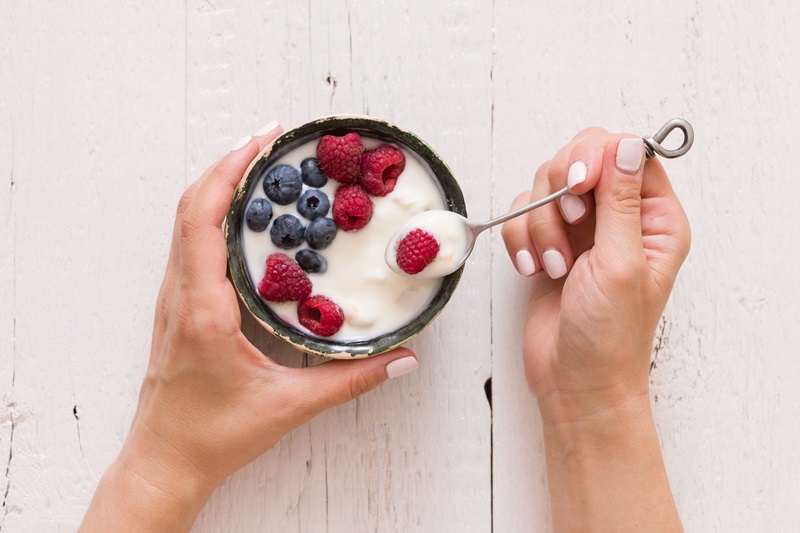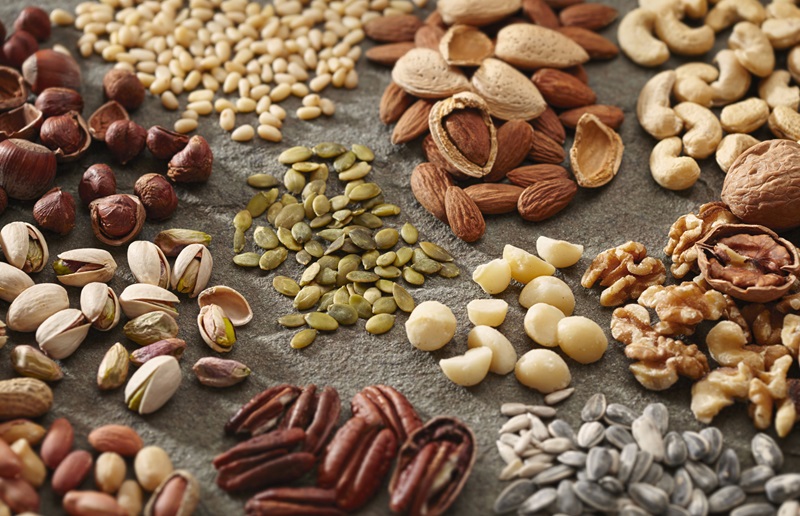Nutrisystem PowerFuels are your weight loss superheroes. These lean proteins and healthy fats work hard to keep you feeling full while supporting a healthy metabolism.
You might be used to reaching for meat, eggs or dairy to satisfy this food group, but have you thought about plant-based options? They’re not just great for variety – they also have some great health benefits.
Here’s a quick look at why they’re worth considering and how to include them in your plan.
Benefits of Eating More Plant-Based PowerFuels
A growing body of research suggests that incorporating more plant-based foods into your diet, as opposed to animal-based foods, offers significant health benefits. Here are a few:
Protect Health. Plant-based proteins are rich in fiber, which aids satiety, supports gut health and assists in regulating blood sugar levels. Studies suggest swapping animal products for plant-based alternatives can lower your risk of developing heart disease and Type 2 diabetes.
Support Weight Loss. Plant-based foods, such as nuts and seeds, are rich in healthier unsaturated fats known to be anti-inflammatory.
Improve Diet Quality. Plant-based foods contain essential vitamins, minerals and antioxidants that support overall health. People who shift to a plant-centered diet tend to eat more of these beneficial nutrients.
How Do Plant-Based Proteins Compare to Animal-Based Proteins?

It’s a myth that animal-based products are a better source of protein than plant-based options. Both can satisfy your body’s protein needs.
The debate around the quality of these protein sources centers on their amino acid content. Amino acids are the building blocks of proteins. Your body uses them for many important jobs, including building and repairing muscles and making hormones.
Among the many amino acids, nine are essential, meaning your body can’t make them and must get them from the food in your diet. Animal proteins typically contain all nine essential amino acids, while plant-based sources may not.
For this reason, animal proteins are termed “complete,” while many plant-based proteins are labeled “incomplete.” However, this does not mean that plant proteins are inferior. The key to meeting all of your amino acid needs, regardless of protein source, is to include a variety of foods in your daily diet.
Below is a list of some of the best plant-based protein options to consider incorporating in your Nutrisystem plan to maximize the health impact of your PowerFuel choices.
Top Plant-Based PowerFuel Options

Serving sizes listed count as 1 PowerFuel option on the Nutrisystem program.
Soy
Soy is one of the plant proteins considered a “complete” protein, as it contains all nine essential amino acids.
- Tofu – 1 cup
- Tempeh – 3 oz. cooked or ½ cup
- Edamame – ½ cup shelled
- Unsweetened soy milk – 8 fl. oz. (1 cup)
- Soy yogurt – ²⁄₃ cup or single serving containers (about 6 oz.)
Nuts
Nuts provide protein, healthy fats and health-boosting vitamins and minerals like magnesium, selenium, and Vitamins E, C and B6. Researchers have found people eating nuts regularly (about a handful per day) had an easier time managing their weight.
- Almonds – 2 Tablespoons or 12 nuts
- Cashews – 2 Tablespoons or 9 nuts
- Pistachios – 2 Tablespoons or 24 nuts
- Walnuts – 2 Tablespoons or 7 halves
- Peanuts – 2 Tablespoons or 17 nuts
- Peanut butter – 1 Tablespoon
Seeds
Like nuts, seeds are jam-packed with healthy fats and fiber to keep you on track with your goals. They’re also a quick grab-and-go option for boosting your protein intake – no cooking required.
- Chia seeds – 2 Tablespoons
- Hemp seeds – 2 Tablespoons
- Pumpkin seeds – 2 Tablespoons
- Sunflower seeds – 2 Tablespoons
- Flaxseeds – 2 Tablespoons whole or 3 Tablespoons ground
- Sesame seeds (or tahini) – 2 Tablespoon seeds or 1 Tablespoon tahini
Oils:
Plant-based oils add flavor, boost meal satisfaction and have anti-inflammatory properties to support your overall health.
- Olive oil – 1 Tablespoon
- Avocado oil – 1 Tablespoon
- Sesame oil – 1 Tablespoon
- Peanut oil – 1 Tablespoon
Other:
- Avocado – ¹⁄₃ fruit or ¼ cup pureed/mashed
- Olives – 8-10 large or 16-20 small
- Plant-based shakes or powder – serving size varies (between 80-140 calories with at least 10g protein and no more than 5g added sugar per serving)
- Veggie/plant-based burgers – 2 oz. cooked or about 1 small slider size patty (no more than 140 calories and at least 10g protein per serving )
Meal and Snack Ideas Using Plant-Based PowerFuels

Including a few more plant-based options in your diet can make a big difference to your health, even if you don’t go entirely plant-based. Below are some ideas and inspiration to get you started.
- Nutrisystem Granola Cereal with 2 Tablespoons of chopped almonds (1 Nutrisystem Breakfast, 1 PowerFuel)
- 6 ounces of soy yogurt topped with 1 cup of berries (1 PowerFuel, 1 SmartCarb)
- Salad veggies with 1 Tablespoon of your favorite light dressing and 2 Tablespoons of sunflower seeds (Vegetables, 1 Extra, 1 PowerFuel)
- Nutrisystem Kung Pao Noodles with 1 cup of cooked, chopped tofu and steamed veggies (1 Nutrisystem Lunch, 1 PowerFuel, Vegetables)
- 3 cups of air-popped popcorn tossed with 2 Tablespoons of peanuts (1 SmartCarb, 1 PowerFuel)
- ½ cup of edamame mixed into a broth-based, non-starchy veggie soup (Vegetables, 1 PowerFuel)
- Nutrisystem Café Style Creamy Tomato Soup topped with 2 Tablespoons of roasted pumpkin seeds (1 Nutrisystem Lunch, 1 PowerFuel)
- 1 rice cake topped with 1 Tablespoon of Peanut Butter and 1 teaspoon of jam (2 Extras, 1 PowerFuel)
- 1 cup of grapes with 2 Tablespoons of cashews (1 SmartCarb, 1 PowerFuel)
- Nutrisystem Harvest Grain Bowl topped with 2 Tablespoons of shelled pistachios (1 Nutrisystem Dinner, 1 PowerFuel)
- 2 oz. veggie burger on a whole grain bun (1 PowerFuel and 1 SmartCarb)
- ¹⁄₃ of an avocado over fresh greens and a ½ cup cooked quinoa (1 PowerFuel, 1 SmartCarb, Vegetables)
Key Takeaway
Discover the health benefits of incorporating more plant-based foods into your diet with Nutrisystem. Make smart choices for weight loss by enriching your meals with plant-based PowerFuels and pre-made vegetarian options. Enjoy unlimited non-starchy veggies , aiming for at least four servings daily to fuel your body with essential nutrients while effectively managing your weight.
References
- Neuenschwander M, Stadelmaier J, Eble J, et al. Substitution of animal-based with plant-based foods on cardiometabolic health and all-cause mortality: a systematic review and meta-analysis of prospective studies. BMC Med. 2023;21(1):404. Published 2023 Nov 16. doi:10.1186/s12916-023-03093-1
- Berg J, Seyedsadjadi N, Grant R. Saturated Fatty Acid Intake Is Associated With Increased Inflammation, Conversion of Kynurenine to Tryptophan, and Delta-9 Desaturase Activity in Healthy Humans. Int J Tryptophan Res. 2020;13:1178646920981946. Published 2020 Dec 17. doi:10.1177/1178646920981946
- Rajaram S, Damasceno NRT, Braga RAM, Martinez R, Kris-Etherton P, Sala-Vila A. Effect of Nuts on Markers of Inflammation and Oxidative Stress: A Narrative Review. Nutrients. 2023;15(5):1099. Published 2023 Feb 22. doi:10.3390/nu15051099
- Crosby L, Rembert E, Levin S, et al. Changes in Food and Nutrient Intake and Diet Quality on a Low-Fat Vegan Diet Are Associated with Changes in Body Weight, Body Composition, and Insulin Sensitivity in Overweight Adults: A Randomized Clinical Trial. J Acad Nutr Diet. 2022;122(10):1922-1939.e0. doi:10.1016/j.jand.2022.04.008
- Baer DJ, Dalton M, Blundell J, Finlayson G, Hu FB. Nuts, Energy Balance and Body Weight. Nutrients. 2023;15(5):1162. Published 2023 Feb 25. doi:10.3390/nu15051162

